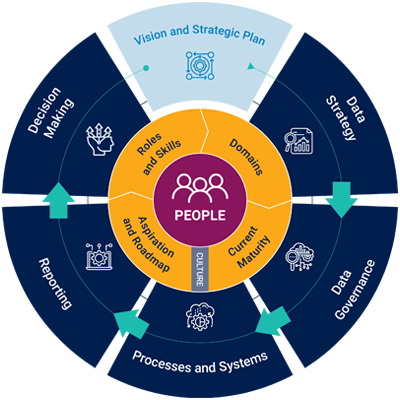Data journey
The data maturity framework incorporates five thematic elements which reflect the data journey.
It seeks to help you consider what is appropriate for your institution or college, now and in the future.
- Data strategy - a data strategy defines the institutional or college role of data.
- Data governance - Institutions and colleges need data that is accurate, timely and complete. Data governance is the accountability, decision-making and assurance that ensures this happens through effective policies, standards and actions.
- Processes and systems - this data is directly used to create live, near live and trend reporting. It is also used to create statutory and regulatory reporting which may be returned in the form of sector wider reports and datasets or used to generate performance metrics.
- Reporting - reporting is the transformation of data tables into information – this is when data becomes visible to most teams.
- Decision making - decision making in this context is the use of reporting outputs to gain value from data assets, realising investment in people and software.
Aligning to institutional and college vision and strategy
Institutional and college strategies reflect consensus on priorities across multiple years. The role of data and reporting in this context is to ensure there is a shared understanding of priority areas before the strategy is agreed, as it is being developed, while it is active, and during assessment of its success.

This includes the following steps:
- Ensure there is shared understanding of the current landscape – size / shape of activity.
- Provide clarity on current performance using appropriate comparators (internal and external).
- Enable analysis and insight to identify opportunities for improvement (growth, consolidation, efficiency).
- Understand the levers that can bring change.
- Support the setting of realistic targets.
- Measure progress as action is taken and the success of the strategy.
Organisational strategies may set operational goals for administrative efficiencies or effectively supporting staff wellbeing. Repeated manual activity and workarounds in data and reporting activities, often under pressure, rarely represent effective practice and can undermine job satisfaction. This may be evident in surveys, for example, low scores for questions such as “I have the tools to do my job well” may indicate problems in this area.
Elements of data maturity that may support organisational development and wellbeing include:
- Understanding system and governance issues that inhibit efficient data management and use.
- Addressing reporting practices and system challenges that may negatively impact on staff experience.
- Enabling a positive and empowering culture of activity and decision making for individuals.
- Clarity on strategic priorities for reporting development with an awareness of the ability to deliver.
Risks to strategy delivery in institutions and colleges with low data maturity
It is not uncommon that strategic goals are discussed and agreed without leveraging reporting effectively:
- With no definitive view on current performance, priorities may be misfocused.
- Strategic and operational priorities do not align as dependencies are not understood.
- Strategic targets cannot be influenced by definable actions within the institution.
- Metrics are included as a proxy for the importance of a function, resulting in too many indicators.
The data burden may undermine attempts to develop working practices:
- Individuals may not meet the remit of their role responsibilities due to time consuming, manual, data collection, management and analysis.
- Functional reviews or restructures may not address underpinning data problems.
More fundamentally, low data maturity presents risk to statutory and legal compliance:
- The accurate delivery of statutory information to funding bodies and regulators.
- Understanding and managing constraints on data production and usage (for example, GDPR).
- The inability to satisfy audit requests.
Data strategy
A data strategy defines the institutional or college role of data.
The data maturity framework is copyright Jisc and made available under CC BY-NC-ND. Find out more about using content from the data maturity framework.